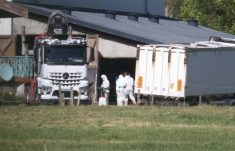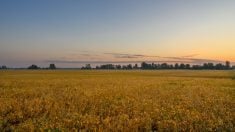The federal government says help is available to British Columbia cattle producers affected by recent forest fires if the province asks for it.
Agri-Recovery and other risk management programs are available if the province asks for help, Agriculture Minister Lawrence MacAuley said July 12 in Calgary.
“We will be there for them. That’s what these programs are all about to make sure we help out,” he said.
The federal government has been in touch with the province, which must request help, but cattle groups are advising the ministries to describe what is needed.
Read Also

U.S. livestock: Cattle fall sharply as Trump says he’s working to lower beef costs
Chicago cattle futures fell sharply on Friday after U.S. President Donald Trump said his administration was working to lower the…
“Being a farmer, I fully understand when you lose stock it’s hard to get compensated,” MacAuley said.
Help will be needed as the province continues under a state of emergency, said Kevin Boone, manager of the B.C. Cattlemen’s Association.
“It is really hard to establish a number (of losses) until those fires are out,” he said.
New fences will be needed as soon as possible and could be covered under a post disaster program. Feed costs could be covered by AgriRecovery, and animal losses may come under AgriStability.
Saving livestock continues to be an issue as the province fights about 300 fires in prime rangeland. As many as 20,000 head of cattle could be affected, but it appears many are able to move out of danger on their own. Gates and fences have been cut, and about 200 head were trucked out of dangerous areas.
“These events hit so fast and with such magnitude, especially in the Williams Lake area, nobody had time but to open some gates and cut some fences,” Boone said.
It took time for regional fire services to get involved so ranchers were on their own when the fires broke out last week.
A dairy farm near Ashcroft evacuated its cattle in 20 minutes with a herculean effort of the owners and neighbours, said Boone.
“For ranchers in the area, it hit so fast and was so hot they just had time to move away. A lot of gates were opened and cattle just moved out,” he said.
There could easily be 1,000 head on 40,000 acres of crown land facing spot fires across the area. This cuts off escape routes.
Cattle are showing up in safe spots, but there could be some killed as well as some suffering from damaged lungs from smoke inhalation or burned feet as they have tried to escape across hot embers.
“We will probably find we have lost more in this series of fires more because of the amount of fires we have rather than the size of fires,” he said.
The B.C. Cattlemen’s Association advises producers to contact wildfires@cattlemen.bc.ca if livestock needs to be evacuated or cared for.
Further links and resources include:
• BC Wildfire Animal Resource Map — an interactive map to provide assistance for people with livestock affected by wildfires.
• https://bcfirerescue.ushahidi.io/views/map
• BC Wildfire Service (current wildfire situation) — http://www2.gov.bc.ca/gov/content/safety/wildfire-status/wildfire-situation
• BC Wildfire Service Facebook Page —www.facebook.com/BCForestFireInfo
• BC Government Fire Information Twitter — https://twitter.com/BCGovFireInfo
• Drive BC — http://www.drivebc.com/
• Drive BC Twitter — https://twitter.com/DriveBC
• Emergency Management BC Wildfire Status — http://www2.gov.bc.ca/gov/content/safety/wildfire-status
barbara.duckworth@producer.com















